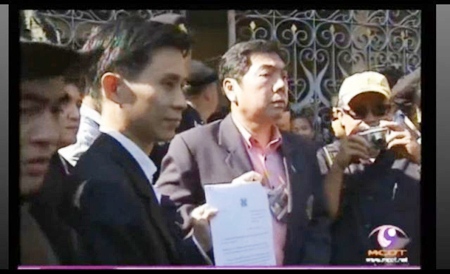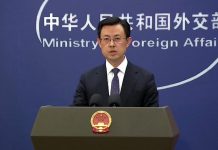BANGKOK, Jan 8 – The anti-government People’s Alliance for Democracy (PAD) petitioned Prime Minister Yingluck Shinawatra today, calling on her administration to defy the pending ruling of the International Court of Justice (ICJ) on the contested land surrounding Phra Viharn (Preah Vihear) temple over Thai and Cambodian ownership.
Panthep Puapongpan, a PAD spokesperson, said Thailand must clearly display its stance against the ICJ judgement and jurisdiction, and refuse to sign any agreement as a result of the court’s order.

Thailand and Cambodia are scheduled to give their oral statements on the dispute at The Hague, Netherlands, on April 15-19.
“Thailand has completely abided by the ICJ’s order. It is not necessary to follow the ICJ’s injunction,” he said. “We are not organising any activity at the moment while watching the government’s direction. If the government follows the ICJ’s order, it is tantamount to intentionally let go of the Thai territory.”
Deputy Prime Minister Phongthep Thepkanchana said the Thai legal team will meet with foreign legal consultants in London next month to prepare the oral statement for presentation to the Court on April 19.
The legal consultants have been given full authority in fighting the case for Thailand’s ultimate interests, said Mr Phongthep, appointed by the premier to supervise the case. He is also education minister.
He said the legal team, including its foreign consultants appointed by the previous government will pursue the case.
The government welcomes suggestions from the Thai people and any organisations concerning the case but final decision depends on the judges, he said, warning against creating negative attitudes towards Thailand.
“Judges are human beings. Their negative attitudes will be unfavourable to Thailand. We will fight to the utmost. We are fighting for the other part of the territory which they (the Cambodians) have claimed ownership. If the court dismisses (the Cambodian) complaint, we will be back to the status quo of the ICJ’s ruling in 1962,” he said.
In its 1962 verdict, the ICJ only ruled that the temple belonged to Cambodia but there was no judgement on the 4.6 sq km of scrubland surrounding the temple. Thailand has claimed ownership of the land, reasoning that the border had never been officially demarcated.
The dispute between the two countries erupted again shortly after the UNESCO approved Cambodia’s bid to have the temple named a World Heritage Site on July 7, 2008.




